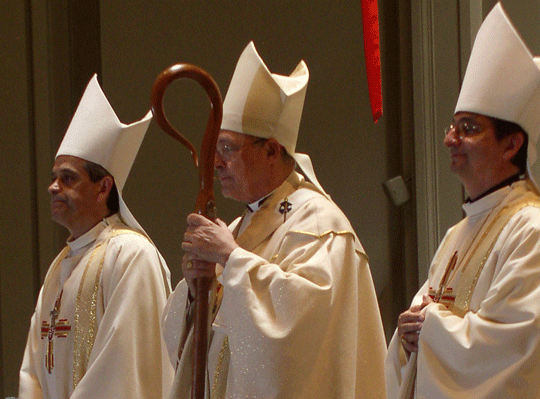COMMENTARY — Joel Connelly
Our state’s Catholic bishops came out strongly against same-sex marriage this past weekend, and appealed for members of the flock to contact their legislators and tell them to uphold the traditional definition of marriage.
 The bishops’ letter left this recently returned Catholic perplexed at the way my shepherds view their faith and human commitment . . . and how they treat people I know who are in loving, committed same-gender relationships, in several cases doing a splendid job of raising children.
The bishops’ letter left this recently returned Catholic perplexed at the way my shepherds view their faith and human commitment . . . and how they treat people I know who are in loving, committed same-gender relationships, in several cases doing a splendid job of raising children.
The bishops used biology to defend the “present definition of marriage”, returning again and again to a theme they described as “the unique and irreplacable potential of a man and woman to conceive and nurture new life thus contributing to the continuation of the human race.”
We humans are, however, created by God as emotional and spiritual and reasoning beings. Is society to legally “recognize” committeed partnerships only for the potential and purpose of procreation?
“Jesus befriended those who were marginalized because He knew it was only in the security of loving, unconditional relationships that hearts and lives are healed,” argues writer Justin Cannon, reflecting the Christian faith as taught to us by Matthew, Mark, Luke and John.
Not only healed, but enriched. I’ve witnessed a warm, very traditional moment over the years. A goofy, dreamy smile crosses the face of a friend, who after years of playing the field announces “Well, I met this woman (or guy)!” It signals a readiness to settle down. My natural reaction is to say, “You lucky dog!” and to be there, in affection and support, when the knot is tied.
Life together is a natural passage in life. Yet, according to “natural law” the Catholic church frowns on my friends who fall in love with somebody of their own gender. It violates nature, according to a U.S. Conference of Catholic Bishops statement, because such “inherently non-procreative” relationships “cannot be given the status of marriage.”
The church’s positions are, as state Sen. Ed Murray put it Friday night, “hurtful” as well as contradictory.
Out of one side of its mouth, the church condemns “all forms of unjust discrimination, harrassment and abuse” against gays and lesbians. At the same time, the Cathechism of the Catholic Church describes “deep-seated homosexual tendencies” as “objectively disordered.”
The bishops see themselves as shepherds, but American Catholics are not sheep. They think and act independently. A recent survey by the Public Religion Research Institute found that nearly three quarters of Catholics favor letting gays and lesbians marry (43 percent) or form civil unions (31 percent).
“Catholics are more supportive of legal recognitions of same-sex relationships than members of any other Christian tradition and Americans overall,” the survey concluded.
The church is also hurting itself: Its social activism, defense of human dignity and witness to peace should make it a beacon for all who seek justice. Instead, the church is pilloried as an instrument of reaction.
Its wounds are self inflicted, a classic case of clerical error. As the National Catholic Reporter put it, editorializing after New York legislators approved marriage equality last spring:
“Even if the bishops had a persuasive case to make and the legislative tools at their disposal, their public conduct in recent years — wholesale excommunications, railing at politicians, denial of honorary degrees and speaking platforms at Catholic institutions, using the Eucharist as a political bludgeon, refusing to entertain any questions or dissenting opinions, and engaging in open warfare with the community’s thinkers as well as those, especially women, who have loyally served the church — has resulted in a kind of episcopal caricature, the common scolds of the religion world, the caustic party of ‘no’.”
A couple examples: Bishop Nichlas DiMarzio of Brooklyn directed that his diocese is “not to bestow or accept honors, nor to texend a platform of any kind to any state elected official, in all our parishes and churches for the forseeable.”
Archbishop John Nienstedy of Minneapolis is pushing an amendment to the Minnesota Constitution defining marriage as the union of a man and a woman. He recently issued a fiat to diocexan priests: “There ought not to be open dissension on this issue. If any have private preservations, I do not wish that they be shared publicly.”
These guys are losing touch, and costing the church credibility.
Public opinion, among believers and non-believers, is undergoing rapid change. The change is rooted in day-to-day human experience.
Contacts with gays and lesbians — as family members, co-workers and friends — underscores the absurdity of such phrases as “objectively disordered.” As NCR noted: “The label is not only demeaning but to contemporary Christians has no resonance with the heart of the Gospel.”
The best advice, which Catholic bishops in Washington and elsewhere should heed, came recently from Nicholas Cafardi, formerly legal counsel to the Diocese of Pittsburgh and formerly a board member of the bishops’ National Review Board for the Protection of Children and Youth:
“We need to give it up. This is not defeatism. This is simply following Jesus in the Gospels, who besides telling us not to act on our fears, also told us to render to Caesar what it Caesar’s and to God what is God’s. Civil marriage is Caesar’s.”
Complete Article HERE!
